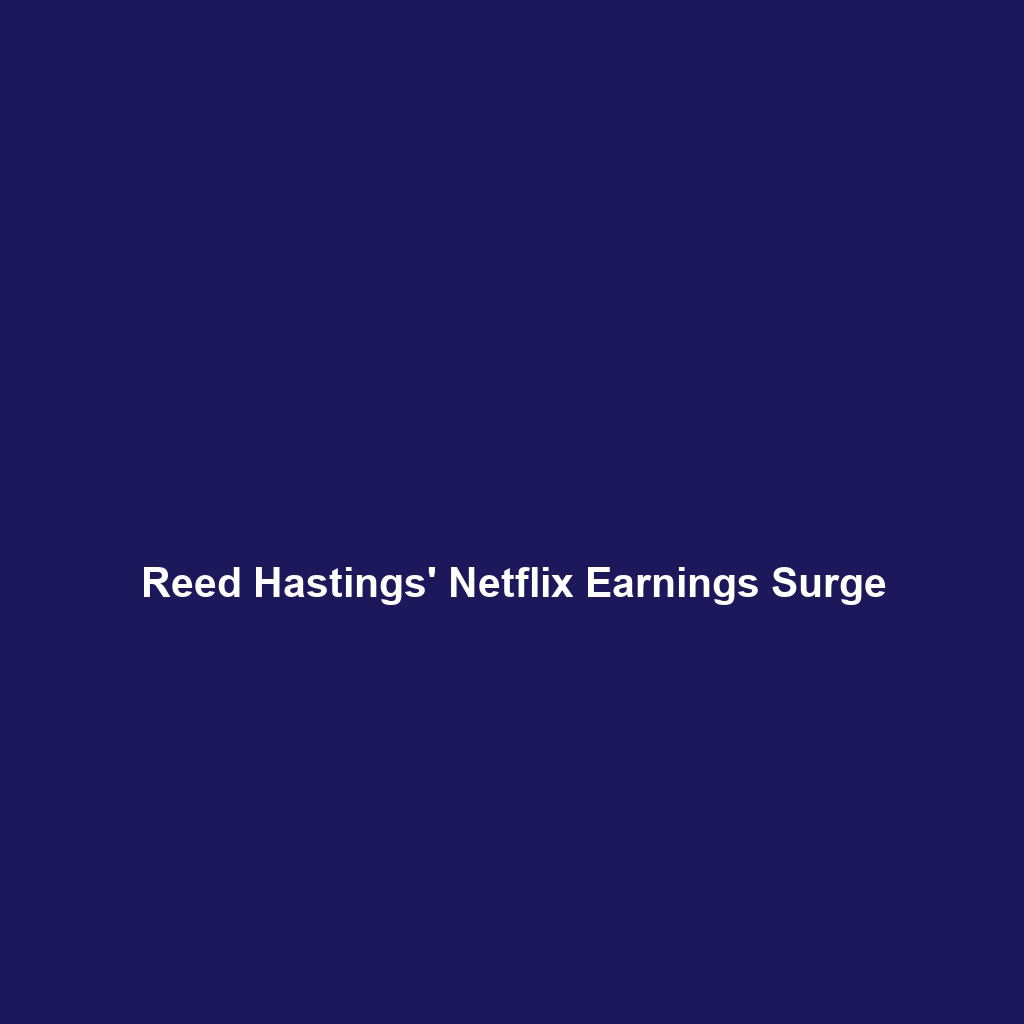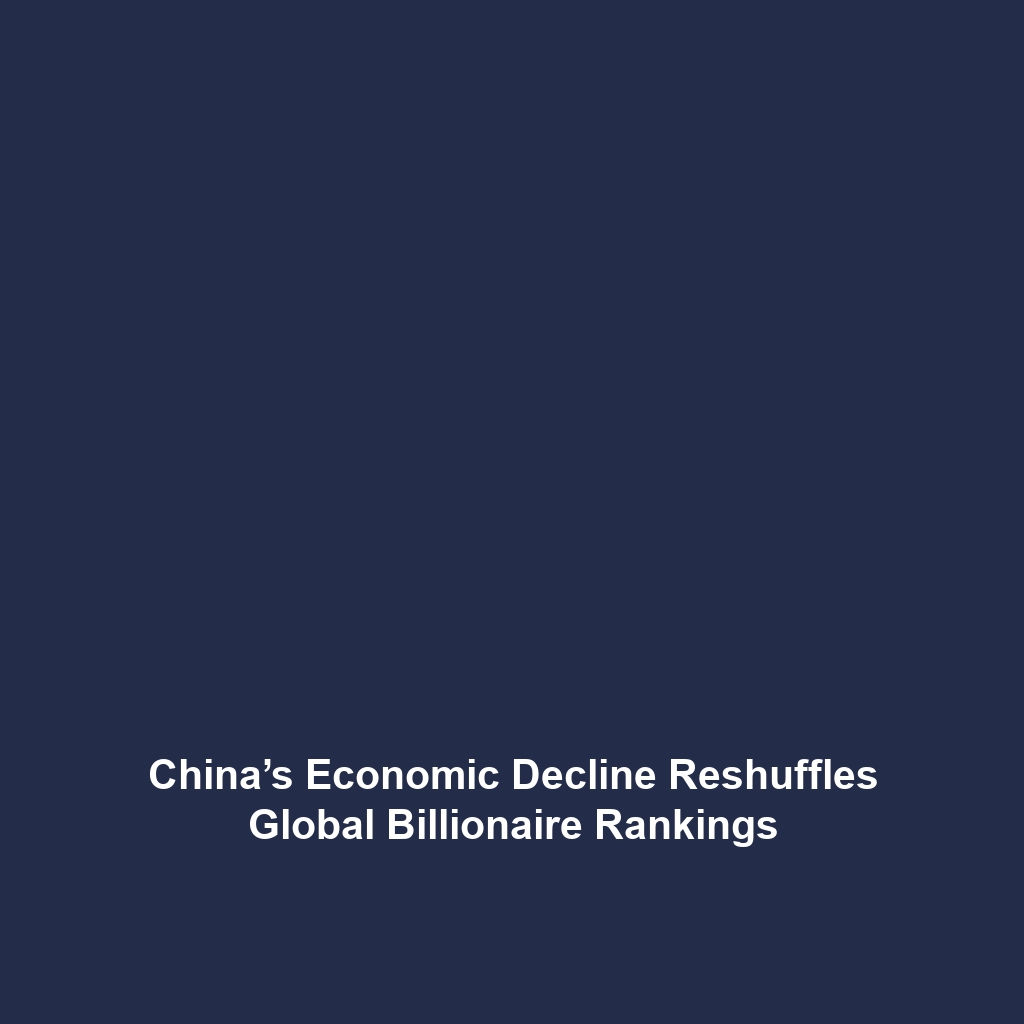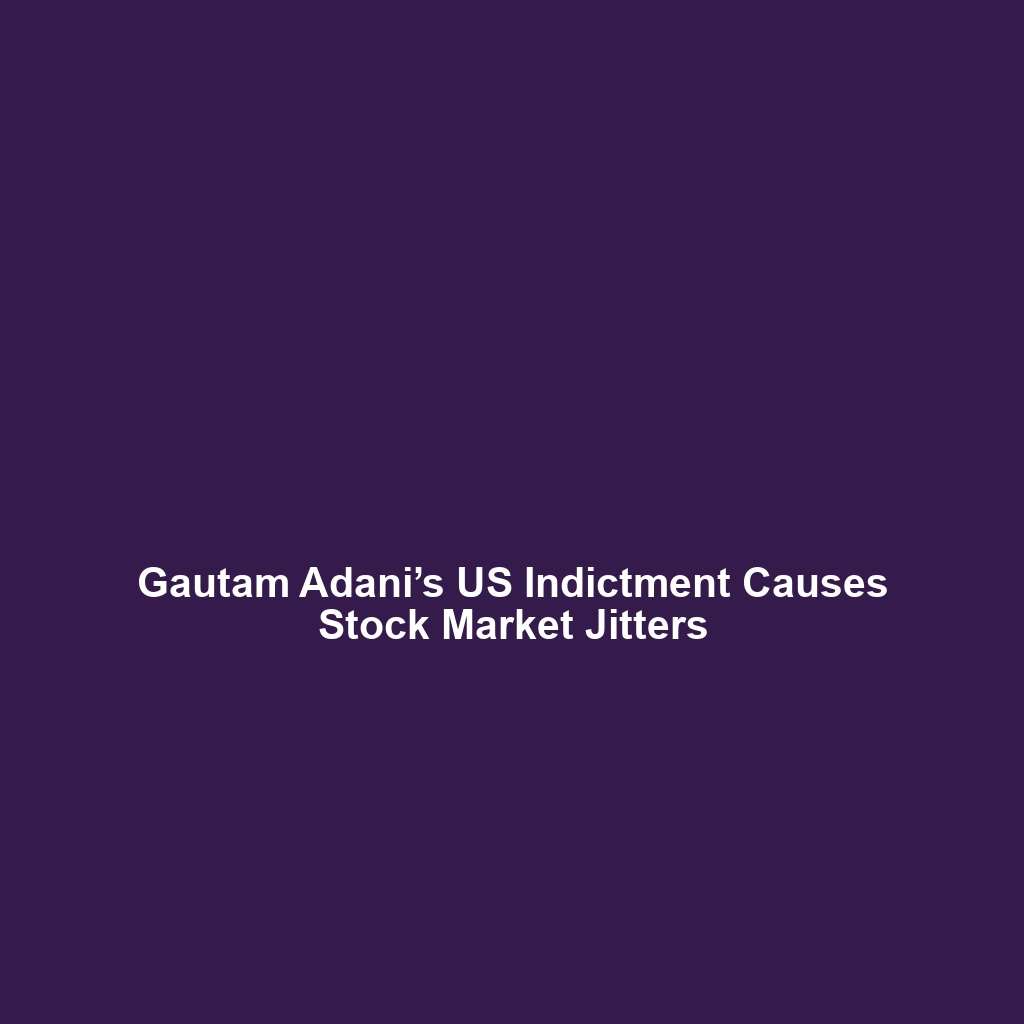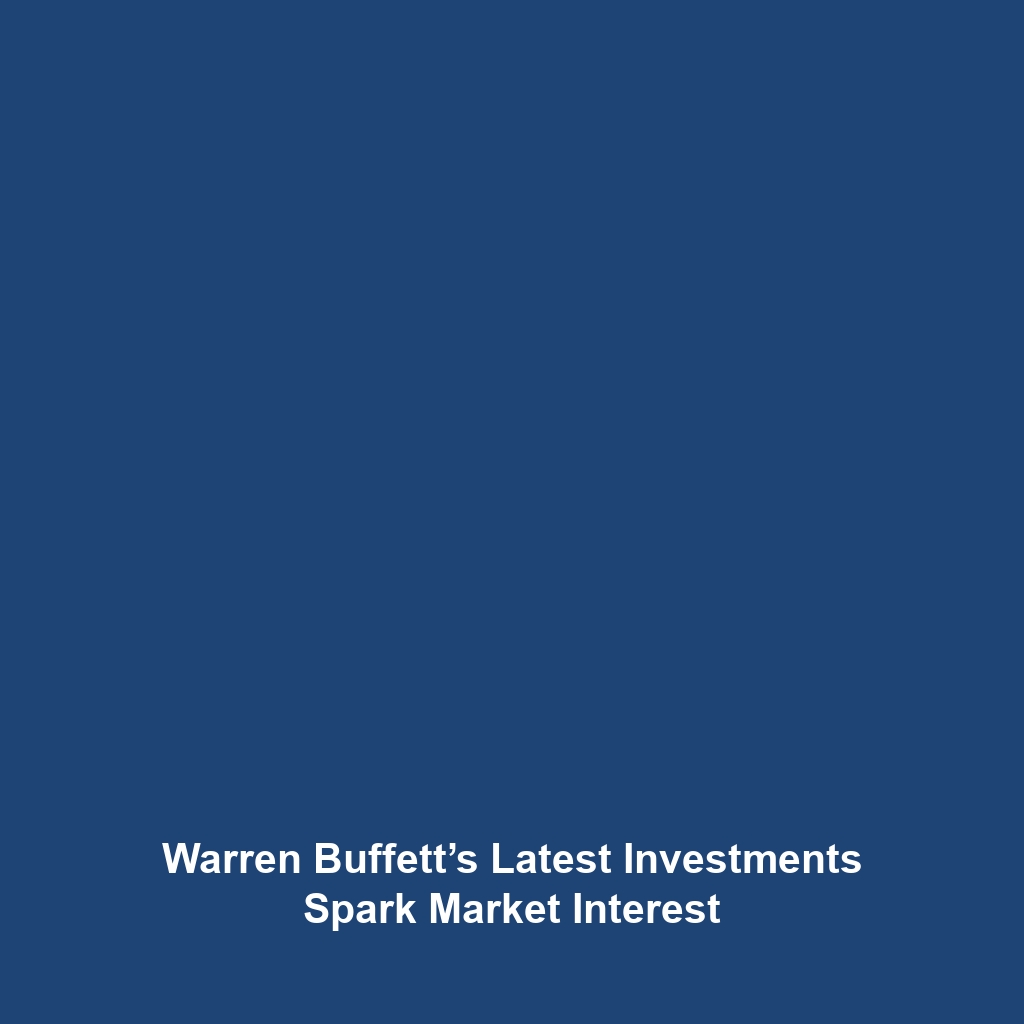Your cart is currently empty!
Tag: investor confidence

Reed Hastings’ Netflix Earnings Surge
Reed Hastings’ Netflix Earnings Surge
Reed Hastings’ Netflix Earnings Surge
In a notable financial turnaround, Netflix’s stock surged by 15% following a strong third-quarter subscriber growth report, leading to a significant boost in earnings for co-founder and CEO Reed Hastings. This remarkable stock rally signals renewed investor confidence in the streaming giant amidst an increasingly competitive industry landscape.
Key Financial Figures from Q3
As reported by Variety, Netflix garnered 8.76 million new subscribers in Q3, far surpassing analysts’ expectations of 6.1 million additions. This growth has put the total subscriber count at approximately 236 million worldwide. The increased viewership is attributed to a robust slate of original programming, including highly successful titles like “The Crown” and “Squid Game,” both of which have significantly boosted engagement and extended membership retention rates.
Impact on Reed Hastings’ Earnings
The significant 15% increase in Netflix’s stock price directly impacts Reed Hastings’ financial standing. With approximately 2.5 million shares in his possession, according to recent filings, Hastings’ net worth increased by roughly $350 million as the stock jumped post-earnings announcement. This spike reflects both Hastings’ continued influence at the company and the importance of Netflix’s performance to its founders.
Market Reactions and Investor Confidence
Investor reaction to the Q3 earnings report has been largely positive. According to financial analysts, the subscriber growth not only reassures investors about Netflix’s strategic direction but also emphasizes the company’s ability to adapt in a challenging market characterized by aggressive competition from rivals such as Disney+, Amazon Prime, and HBO Max. Many investors are optimistic about Netflix’s long-term growth potential, particularly with upcoming releases scheduled for the holiday season.
Challenges Ahead for Netflix
Despite the positive quarterly results, industry experts caution against potential hurdles that Netflix may face going forward. As the streaming industry evolves, Netflix will need to sustain its content creation capabilities while managing increased costs. The rise of platforms owned by tech giants like Apple and Google raises questions about content leadership and viewer loyalty.
Moreover, a recent decline in domestic subscriber growth has prompted Netflix to focus its efforts on expanding internationally. With a growing number of consumers turning to a variety of media sources, retaining subscribers remains one of the main challenges for the company. Industry analysts recommend that Netflix continue investing in diverse, high-quality programming and also consider experimenting with pricing strategies to maintain its competitive edge.
Expert Opinions on Future Growth
Experts in the media sector have weighed in on Netflix’s prospects following the recent earnings blowout. “Hastings has managed to steer Netflix through numerous storms, but the real test will be sustaining growth as new competitors emerge,” noted Jane Anderson, a media analyst at Market Research Services. “The company’s focus on unique content and strategic partnerships will be critical for maintaining its lead in the industry.”
Further substantiating these assertions, Michael Dunn, CEO of a leading investment firm, stated, “Investors have reacted positively because they see potential in Netflix’s approach to global expansion. However, the momentum must also be coupled with a commitment to quality content and effective marketing strategies to keep viewers engaged.” His insights reflect the importance of not becoming complacent after the recent successes.
Conclusion
Reed Hastings’ financial windfall from Netflix’s recent stock climb underscores the company’s ability to innovate and attract an expanding audience. As it navigates the complexities of a saturated streaming market, its future success will hinge on consistently delivering compelling content and adapting to shifting consumer preferences. Investors remain closely monitoring the company’s trajectory as it positions itself for sustained growth in an evolving entertainment landscape.
For continuous updates on Netflix’s performance and industry trends, stakeholders are encouraged to follow financial news outlets and market analytics platforms.

Heloise Pratt Suing Estranged Husband Alex Waislitz
Heloise Pratt Suing Estranged Husband Alex Waislitz
Heloise Pratt Suing Estranged Husband Alex Waislitz
In a significant legal battle stirring up Melbourne’s elite circles, Heloise Pratt has launched a lawsuit against her estranged husband, Alex Waislitz, citing allegations of financial misconduct involving their shared company, Thorney Investments. The lawsuit has garnered widespread media attention, highlighting the complexities of their private and professional relationship.
Background on Heloise Pratt and Alex Waislitz
Heloise Pratt and Alex Waislitz are well-known figures in the Australian business community. Waislitz, a prominent businessman and investor, is the founder of Thorney Investment Group, which manages investments across various sectors, including technology and healthcare. Heloise Pratt, an accomplished businesswoman, has been involved in numerous philanthropic endeavors and corporate roles.
The couple’s relationship has come under scrutiny following their separation, which was announced earlier this year, and has now escalated into a legal dispute that may have significant financial implications for both parties.
Details of the Lawsuit
Heloise Pratt’s lawsuit alleges that Alex Waislitz engaged in financial misconduct that has adversely affected her position and interests in Thorney Investments. Specific allegations include claims of mismanagement of assets and improper use of company funds that may have been diverted from their intended purposes.
Sources familiar with the case indicate that Pratt is seeking compensation that reflects the potential loss of revenue and damages associated with Waislitz’s actions. The exact amount sought in damages has not been disclosed.
Impact on Thorney Investments
The allegations against Waislitz may also have ramifications for Thorney Investments, as the company is closely scrutinized amid the rising legal tensions. Industry analysts speculate that the lawsuit could potentially undermine investor confidence, particularly if evidence of wrongdoing is presented during litigation.
“The board at Thorney Investments is facing a challenging situation,” commented financial analyst Emma Roberts. “Any negative findings could lead to a significant reputation impact and possible financial implications.”
Reactions from the Business Community
The news of Pratt’s lawsuit has sent shockwaves through Melbourne’s elite, with many insiders expressing concern about the impact this could have on the city’s business landscape. Socialite circles, which often revolve around high-profile couples and their ventures, are closely watching developments in the case.
Several business leaders have declined to comment directly on the lawsuit, citing ongoing investigations or the need for discretion. However, some have acknowledged the personal nature of the dispute and its potential to disrupt existing networks and relationships within the business community.
Legal Perspectives on the Case
Legal experts have weighed in on the possible outcomes of Pratt’s lawsuit. Family law attorney Sarah Thompson stated, “This case will hinge on the evidence presented regarding financial transactions and the fiduciary responsibilities of both parties within their business arrangements.”
Thompson further explained that proving financial misconduct can be challenging but not impossible, particularly if there is a clear delineation of responsibilities and evidence of financial impropriety. The ability of Pratt’s legal team to substantiate their claims will be pivotal in determining the outcome.
Conclusion
As the legal dispute unfolds, Heloise Pratt’s lawsuit against Alex Waislitz is poised to draw further attention from both the media and the public. The implications not only affect their personal lives but also raise questions about corporate governance and financial ethics within family-run businesses.
Observers will be watching closely to see how this case develops and whether it will lead to broader discussions about accountability in financial management among significant investments. For now, the elite circles of Melbourne remain abuzz with speculation, as the legal battle continues to unfold.

Gautam Adani Charged with Bribery and Fraud
Gautam Adani Charged with Bribery and Fraud
Gautam Adani Charged with Bribery and Fraud
In a significant legal development, Indian billionaire Gautam Adani has been charged with bribery and fraud by U.S. authorities. The allegations involve $265 million purportedly paid in bribes to secure contracts for solar energy projects. The charges were filed in a New York court, marking a critical moment in the ongoing scrutiny of Adani’s business practices.
The Charges Against Gautam Adani
Gautam Adani, founder and chairman of the Adani Group, is facing serious allegations involving illicit payments in connection with contracts related to solar energy projects in India. The U.S. Department of Justice has initiated legal proceedings that assert Adani and several associates engaged in a systematic scheme to bribe foreign officials to obtain contracts and facilitate operations in the renewable energy sector.
According to the charges, Adani allegedly authorized significant sums of money to be funneled through intermediaries to government officials in India. These payments were purportedly aimed at ensuring the company secured lucrative contracts in the burgeoning solar energy market, with investors expressing concern over the legality and ethics of such practices.
Background on Adani Group and Solar Energy
The Adani Group has rapidly ascended to prominence as one of India’s largest conglomerates, with interests spanning across various sectors, including energy, infrastructure, and logistics. In recent years, the group has made substantial investments in renewable energy, particularly solar. By 2022, it had become one of the world’s largest solar power producers.
However, rapid growth has accompanied scrutiny. Critics of the Adani Group have raised questions regarding transparency and compliance with international laws. The allegations of bribery come at a time when the global shift towards renewable energy is under intense examination, highlighting the complexities of navigating regulatory frameworks in emerging markets.
Legal Implications and Responses
The legal charges against Gautam Adani could have far-reaching implications for both the Adani Group and the broader business climate in India. If found guilty, Adani could face severe financial penalties and possible imprisonment. This situation also poses reputational risks for the Adani Group, which may impact investor confidence and future contracts.
In response to the charges, an Adani Group spokesperson stated, “The allegations are completely baseless and represent a mischaracterization of the company’s prudent business practices. We are fully committed to conducting our business in compliance with the law and with the highest ethical standards.” The statement reflects the firm’s intention to vigorously defend against the charges, which they believe will be proven unfounded.
Reactions from Experts and Market Analysts
Market analysts are closely watching the developments surrounding Adani. “The ramifications of these charges are significant not only for the Adani Group but for the perception of corporate governance in India,” noted financial analyst Ravi Kumar. He stresses that such allegations could lead to increased scrutiny of other Indian conglomerates, as investors seek clarity regarding regulatory compliance in the country.
Additionally, the ongoing investigations may have an adverse effect on foreign direct investment in India’s renewable energy sector. International investors often weigh legal stability and corporate integrity when committing resources to emerging markets. Concerns about governance could deter investment, which India is trying to attract to bolster its energy infrastructure.
The Broader Context of Corruption in India
The charges against Adani are emblematic of broader concerns surrounding corruption and governance within India’s political and business landscape. While India has made strides in combating corruption, challenges persist, particularly in large-scale infrastructure projects that often involve significant government interaction.
Experts suggest that cases like that of Adani are crucial for initiating discussions about reform in corporate governance and transparency. “This situation highlights the need for comprehensive reforms to curtail corruption and enhance accountability among corporate entities in India,” commented political analyst Anjali Mehta. The resolution of these legal challenges may determine the future of business ethics in the region.
Conclusion
The legal proceedings against Gautam Adani mark a pivotal point in the scrutiny of corporate governance among India’s business elite. With serious allegations of bribery and fraud now in the spotlight, the implications for Adani and the broader economic environment in India are profound. Investors, analysts, and policymakers will be keenly observing the outcome of this case, which may have lasting effects on how corporate entities operate within the framework of India’s regulatory landscape.
As the situation develops, further insights and updates will be critical for stakeholders invested in India’s economic future and its burgeoning renewable energy sector.

China’s Economic Decline Reshuffles Global Billionaire Rankings
China’s Economic Decline Reshuffles Global Billionaire Rankings
China’s Economic Decline Reshuffles Global Billionaire Rankings
China’s ongoing economic downturn has had profound implications on the global wealth landscape, most notably resulting in the removal of 155 billionaires from the prestigious list of the world’s wealthiest individuals. The ripple effects of this recession extend beyond financial losses for these high-net-worth individuals, reshaping the distribution of wealth across the globe.
Understanding the Economic Context
In recent years, rapid economic growth in China has significantly contributed to the emergence of a new class of billionaires. According to Forbes, the nation was home to approximately 1,200 billionaires, a figure that has been sharply reduced by the recession affecting various sectors, including real estate and manufacturing.
The decline in economic performance can be attributed to multiple factors, including stringent COVID-19 policies, a debt crisis within the property sector, and declining consumer confidence. The Chinese government’s decision to adjust its economic policies, aimed at promoting sustainable growth rather than rapid expansion, has further complicated the landscape.
Impact on Billionaires and Wealth Distribution
The significant drop in the number of billionaires is indicative of a broader trend in wealth distribution captured in the recently released Bloomberg Billionaires Index. For instance, China’s richest individuals such as Jack Ma and Zhong Shanshan experienced sharp declines in their fortunes, as their businesses faced increased regulatory scrutiny and market challenges.
The reduction of billionaires in China is not only a local phenomenon but also reshapes the global billionaire landscape. These changes mean a notable shift in wealth concentration, potentially benefitting billionaires from other countries as they gain relative prominence on lists compiled by financial media outlets.
Global Reactions and Future Outlook
In response to the decline of wealth among Chinese billionaires, global markets have reacted with a mix of caution and interest. Investors are closely monitoring how China adapts its economic strategy in the coming years. Financial analysts are divided on the long-term impact of these shifts, with some predicting accelerated global integration of wealth, while others foresee a potential return to stability for China’s economy.
Mark Zandi, chief economist at Moody’s Analytics, stated, “China’s economic challenges will require concerted efforts to stabilize the financial markets and restore investor confidence. Until then, the global economic landscape will remain quite volatile as adjustments are made.” This sentiment underscores the unpredictability of markets heavily influenced by China’s economic performance.
The Bigger Picture: A Shift in Global Wealth
Historically, the rise and decline of billionaires often coincide with broader economic trends. The current condition in China serves as a stark reminder of the interconnectedness of global economies. As Beijing wrestles with internal economic pressures, the effects are felt worldwide, particularly in markets reliant on robust trade links.
Countries such as the United States and India may see increased activity among their wealthiest individuals, as they potentially capitalize on the market void left by the diminishing count of Chinese billionaires. This shift could validate forecasts regarding the eventual center of wealth moving away from Asia towards the West.
Conclusion
China’s economic decline has reshaped the landscape of global wealth, marking a significant reduction in the number of billionaires from the country. As 155 billionaires disappear from consolidated wealth lists, the implications transcend national borders, emphasizing the interconnected nature of global economics.
Emerging from this economic turmoil may depend on China’s capacity to stabilise its economy and restore confidence. As the situation evolves, the global community is left to grapple with the profound changes to wealth distribution and the ongoing implications for economic policies worldwide.
For further insights into the shifting dynamics of wealth and the global economy, readers can visit trusted financial news platforms such as Bloomberg, Forbes, and The Economist.

Arnault’s LVMH Dominance Secures Him Top Spot on Rich List
Arnault’s LVMH Dominance Secures Him Top Spot on Rich List
Arnault’s LVMH Dominance Secures Him Top Spot on Rich List
Bernard Arnault, the French luxury goods mogul and chairman of LVMH Moët Hennessy Louis Vuitton, has surpassed Elon Musk as the world’s richest person, solidifying his position at the top of global wealth rankings. As of October 2023, Arnault’s net worth has soared to an impressive $222 billion, buoyed by the ongoing success and expansion of his luxury empire, LVMH, which controls some of the most recognized brands in fashion, alcohol, and cosmetics.
LVMH’s Market Leadership
LVMH, the world’s largest luxury goods conglomerate, has seen remarkable growth in recent years. The company reported a staggering revenue increase of 20% year-on-year, driven largely by strong sales in Asia and America. Key brands within the LVMH portfolio, including Louis Vuitton, Dior, and Moët & Chandon, have contributed significantly to this profit surge, reflecting consumers’ insatiable demand for luxury goods, even amid a fluctuating global economy.
According to a report by Business of Fashion, Arnault’s strategic focus on expanding the LVMH brand into emerging markets has positioned the company advantageously in the luxury sector. With China returning to growth following its stringent COVID-19 measures, sales in the region have rebounded, resulting in heightened consumer spending on high-end products.
Investor Confidence and Stock Performance
Investor confidence in LVMH has also surged, leading to a 30% rise in the company’s stock this year. Analysts attribute this upward trend partly to Arnault’s adept management and his ability to foresee market shifts. Henri Bénard, a market analyst at Wells Fargo, stated, “Arnault possesses a unique ability to create brands that resonate with consumers. His leadership at LVMH is a key factor in the brand’s resilience and growth.”
Furthermore, the luxury sector as a whole is experiencing a renaissance, with experts predicting continued growth in the coming years. According to Deloitte’s Global Powers of Luxury Goods report, the global luxury market is expected to reach over $350 billion by 2025, highlighting the sector’s robust recovery and expansion.
Competitive Landscape
Arnault’s ascension to the top spot comes at a time when competition within the luxury market is intensifying. Elon Musk, formerly the world’s richest man, has faced challenges with Tesla’s stock performance and has diverted attention toward his ventures in space exploration and artificial intelligence. In contrast, Arnault’s LVMH remains focused on product innovation and brand penetration, allowing the company to maintain a competitive edge.
Rival brands such as Kering, which owns Gucci and Yves Saint Laurent, are also striving to capture market share. Kering’s CEO, François-Henri Pinault, acknowledged the ongoing competition in the sector, stating, “It’s a challenging environment, but we are committed to innovating and enhancing our brand’s appeal.” Nevertheless, LVMH’s diversified portfolio and strong brand equity continue to position it as a market leader.
The Personal Story of Bernard Arnault
Bernard Arnault, born in 1949 in Roubaix, France, transformed his family’s construction business into a luxury powerhouse. He acquired Louis Vuitton in 1987 and merged it with Moët Hennessy, effectively laying the foundation for LVMH. Arnault’s vision encompasses more than just profit; he aims to position LVMH as a cultural institution. His hands-on approach includes overseeing the launch of new products and ensuring that each brand maintains its unique identity.
Arnault’s influence extends beyond just LVMH. He has been an advocate for sustainable practices within the luxury industry, emphasizing the importance of responsible sourcing and production. This shift is increasingly important to consumers, particularly younger generations who prioritize sustainability in their purchasing decisions.
Outlook and Future Considerations
Looking ahead, Arnault’s focus remains on expanding LVMH’s global footprint while navigating potential economic uncertainties. While concerns such as inflation and geopolitical tensions pose risks, the sector’s fundamental strength presents opportunities for continued growth. The company’s robust investment in emerging technologies and digital platforms reflects a commitment to future-proofing its business against market fluctuations.
Industry experts anticipate that Arnault will continue to innovate and adapt to changing consumer preferences, driving LVMH’s success. As the luxury market evolves, Arnault’s leadership and vision will be pivotal in maintaining LVMH’s status as a quintessential brand in the luxury landscape.
Conclusion
Bernard Arnault’s ascent to the top of the world’s rich list underscores the immense potential of the luxury market under his stewardship. As LVMH continues to expand and evolve, Arnault’s multifaceted leadership style and strategic foresight will be crucial for navigating both opportunities and challenges ahead. With a net worth of $222 billion and a diversified portfolio generating consistent revenue, Arnault is not only a symbol of wealth but also of the resilience of the luxury industry in a rapidly changing economic landscape.

Billionaire Alex Waislitz’s Travels Halted Amid Family Legal Dispute
Billionaire Alex Waislitz’s Travels Halted Amid Family Legal Dispute
Billionaire Alex Waislitz’s Travels Halted Amid Family Legal Dispute
Billionaire investor Alex Waislitz is currently facing significant disruptions in his travel plans and business dealings due to an ongoing legal dispute with his ex-wife, Heloise Pratt. The battle, which has implications for Waislitz’s financial interests and personal life, raises questions about the impact of public legal conflicts on high-profile individuals.
Overview of the Legal Dispute
Waislitz, the founder of Thorney Investment Group, has become embroiled in a contentious divorce settlement that has escalated into a full-blown legal fight. The disputes center around asset division and financial disclosures, with Pratt reportedly contesting various aspects of their financial arrangements.
The legal proceedings began in early 2023 when Pratt sought to challenge the financial disclosures made by Waislitz during their divorce proceedings. Legal experts have noted that the complexity of the couple’s financial dealings, including investments and real estate holdings, may prolong the resolution of these issues.
Impact on Travel Plans
Waislitz’s travel plans have been significantly affected by the legal disputes. Reports suggest that his planned business trips and attendance at international events have been delayed or canceled to ensure that he remains available for court proceedings and legal consultations.
A spokesperson for Waislitz indicated that the billionaire’s travel has been curtailed in order to prioritize legal commitments. As a prominent figure in the investment community, these disruptions are likely to hinder his ability to network and explore new business opportunities on a global scale.
Analysis of Business Consequences
The ongoing legal battle poses serious risks for Waislitz’s business interests. Analysts suggest that uncertainties arising from legal disputes can lead to volatility in investor confidence and may impact the performance of funds managed by Thorney Investment Group. If potential investors perceive instability in Waislitz’s personal affairs, they may be hesitant to engage in new ventures or apply for investment opportunities.
Industry experts also emphasize the importance of maintaining a solid public image in finance. “For high-profile investors like Waislitz, legal disputes can overshadow accomplishments and lead to reputational damage,” explained financial analyst Dr. Samantha Weller. “Stakeholders prefer stability, and extended legal issues create the impression of risk.”
Public Response and Media Coverage
Media coverage of the Waislitz-Pratt legal battle has drawn significant attention, with various outlets tracking the developments closely. The personal nature of the dispute invites public scrutiny, with social media users and commentators discussing the ramifications not only for Waislitz but for similar high-net-worth individuals facing domestic disputes.
Commentary surrounding the case touches on broader themes, including the balance between personal lives and business responsibilities for billionaires. Critics claim that public figures must be prepared for scrutiny of their personal affairs, which can impact their professional trajectories.
Expert Opinions on Legal Strategies
Legal experts suggest that both parties may need to adopt strategic approaches to resolve the dispute more efficiently. Family law attorney Mark Ellis argues, “Reaching a settlement outside of court can often reduce the emotional and financial toll on both sides. Public disputes rarely yield satisfactory outcomes for either party in the long run.”
As the legal process unfolds, it is imperative for both Waislitz and Pratt to consider not just the financial implications, but the broader impact on their personal lives and reputations. The ongoing nature of the dispute indicates that a resolution may still be some time away.
Conclusion: The Path Forward
The legal battle between Alex Waislitz and Heloise Pratt is likely to continue to create obstacles for the billionaire, particularly as it relates to his travel and business activities. The case serves as a reminder of the complex interplay between personal issues and professional responsibilities faced by individuals in high-stakes positions.
As the parties work through the legal system, observers will be watching closely to see how this conflict unfolds and what it means for Waislitz’s future ventures. In the meantime, it is clear that this legal dispute is not just a private matter but one that has far-reaching consequences for Waislitz’s business ecosystem.

Gautam Adani’s US Indictment Causes Stock Market Jitters
Gautam Adani’s US Indictment Causes Stock Market Jitters
Gautam Adani’s US Indictment Causes Stock Market Jitters
Indian billionaire businessman Gautam Adani, Chairman of the Adani Group, faces serious accusations in the United States, prompting deep concerns within global markets. Following the indictment, several investments and infrastructure deals, particularly in Africa, are now in jeopardy, as seen in Kenya’s recent decision to scrap a significant airport development contract linked to Adani.
Impact on Global Markets
The news of Adani’s indictment reverberated beyond Indian shores, causing tremors in stock exchanges globally. The allegations against Adani, which include fraud and conspiracy, resulted in a sell-off among investors wary of the implications for the company’s extensive portfolio. Shares of the Adani Group experienced significant declines, leading to over $7 billion in losses on a single trading day.
According to market analysts, the uncertainty surrounding Adani’s legal challenges may continue to negatively affect investor confidence, not just in the Adani Group but in the broader Indian market. “Whenever a major business tycoon faces legal challenges like this, it does create ripples across the market,” said Andy Brown, a financial analyst at Market Insights. “Investors often react instinctively to news that poses a threat to corporate governance and financial integrity.”
Kenya’s Airport Project Cancellation
The indictment has already led to tangible repercussions. The Kenyan government announced the cancellation of a major airport project that was to be developed and financed by the Adani Group. This $2 billion contract was aimed at constructing a new international airport in the coastal city of Mombasa. This abrupt cancellation reflects the growing concerns of foreign investors regarding the stability of engagements with the Adani Group.
In a statement, Kenyan Transport and Infrastructure Minister Karanja Kibicho indicated that “the decision underscores our commitment to ensuring transparency and accountability in our development projects.” The cancellation could have long-term ramifications for Kenya’s infrastructure goals, impacting investment flows and economic growth.
Expert Perspectives on Legal Ramifications
The allegations against Adani have drawn significant scrutiny from legal experts, who have posited that the outcome of the indictment could lead to stricter regulatory oversight in India and potentially globally. “Legal repercussions may extend beyond financial penalties,” comments Dr. Neha Kumar, a corporate law expert at the University of Delhi. “It could lead to a re-evaluation of how infrastructure deals are assessed and approved, particularly in emerging markets where corruption is a concern.”
Additionally, industry watchers predict that Adani’s legal troubles may influence how international partners approach future investments in India, where the Adani Group has been a major player in various sectors, including energy, transportation, and agribusiness.
Stock Market Reactions and Future Outlook
The stock market reaction to Adani’s indictment has been swift and harsh. Investors have offloaded shares, not only related to Adani but also in associated sectors that may feel the ripple effects. The Nifty 50 index in India saw a decline of over 2%, with several companies associated with Adani Group bearing the brunt of the losses.
A report from the economic think tank, India Market Research, noted that “the broader implications for the economy remain to be seen, particularly if investor confidence continues to wane.” Analysts caution that if the situation escalates, we could witness a broader economic slowdown as capital allocators pull back amidst rising uncertainty.
Conclusion: Navigating Uncertainties Ahead
The fallout from Gautam Adani’s indictment has established a precarious situation for global markets, particularly affecting infrastructure investments. As the global community monitors developments closely, the potential long-term effects remain layered with uncertainty. It will be crucial for stakeholders and investors to assess their risk exposure and engage proactively to navigate these challenging waters.
The next steps for Adani Group and the outcomes of ongoing legal proceedings will likely shape not just their future, but also that of associated businesses and economies heavily invested in infrastructure development. As this story continues to unfold, markets will be on high alert for updates that could further influence investment climates around the globe.

CSCO Stock Climbs After Cisco Reports Strong Earnings
<>
CSCO Stock Climbs After Cisco Reports Strong Earnings
CSCO Stock Climbs After Cisco Reports Strong Earnings
Cisco Systems Inc. (CSCO) has garnered significant investor attention following the release of its latest earnings report, which surpassed analysts’ expectations. The tech giant’s stock saw a notable increase in value as markets reacted positively, reflecting confidence in Cisco’s ongoing operational performance and strategic direction.
Earnings Report Overview
For the third quarter of its fiscal year 2023, Cisco reported earnings of $0.96 per share, exceeding the consensus estimate of $0.91 according to Refinitiv. The company’s revenue reached $15.73 billion, a 14% increase compared to the same quarter last year, which further outperformed analysts’ expectations of $15.36 billion.
The robust performance can be attributed to strong demand for networking hardware and software, which has surged as businesses continue to invest in digital transformation initiatives.
Key Business Segments Driving Growth
Cisco’s growth was primarily fueled by its infrastructure platforms, which include routing, switching, and data center products. This segment reported a 15% year-over-year growth, significantly contributing to the overall revenue.
The security solutions segment also performed remarkably, posting a 25% increase in revenue, driven by heightened concerns over cybersecurity threats. Cisco’s investments in its SecureX platform and enhanced security offerings resonate well with enterprises prioritizing security in their operations.
Market Reaction and Stock Performance
Following the announcement, CSCO shares rose by approximately 5% in after-hours trading, reflecting investor enthusiasm about the sustained growth trajectory. Analysts noted that this positive momentum may well continue, depending on broader market conditions and Cisco’s ability to maintain its growth in upcoming quarters.
According to Wells Fargo analyst Aaron Rakers, Cisco is positioned well within the market and has a solid growth framework, particularly benefiting from its hybrid work solutions that cater to the evolving needs of businesses globally. Rakers maintained an ‘overweight’ rating on CSCO, emphasizing the company’s solid fundamentals and market positioning.
Long-Term Strategic Vision
Cisco’s strategic focus on enhancing its software offerings, particularly in cloud and subscription services, is expected to drive future revenue growth. The company’s transition towards a more subscription-based revenue model, which currently represents a growing proportion of its overall earnings, reflects a broader shift in the technology landscape.
Chuck Robbins, Cisco’s Chairman and CEO, highlighted the firm’s commitment to innovation and adaptability in the rapidly changing tech environment during the earnings call. He stated, “Our approach to fostering a more cloud-centric environment not only meets current customer demands but also anticipates future needs.”
Challenges Ahead
Despite the positive report, Cisco and the broader tech industry face ongoing challenges, including supply chain disruptions and inflationary pressures. These factors could potentially hinder production capabilities and impact pricing strategies moving forward.
Additionally, global economic uncertainty and market volatility might affect future investment decisions in technology, which could impact Cisco’s business performance overall. Analysts are advised to monitor these ongoing challenges closely as they could influence CSCO’s stock trajectory.
Conclusion and Future Outlook
Cisco’s impressive earnings report has generated optimism among investors, driving CSCO stock upward as the company demonstrates solid growth across key business segments. The transition toward a subscription model and robust cybersecurity offerings may serve as fundamental strengths.
Nevertheless, Cisco must navigate potential challenges including supply chain issues and economic uncertainty. Continued focus on innovation and strategic planning will be essential as the company aims to maintain its upward momentum in a competitive market landscape.
Investors and market analysts will keenly watch Cisco’s performance in the upcoming quarters, as the tech sector continues to evolve amidst changing economic conditions.

CVNA Stock Surges After Announcing Strategic Partnerships
CVNA Stock Surges After Announcing Strategic Partnerships
CVNA Stock Surges After Announcing Strategic Partnerships
Carvana Co. (CVNA) has experienced a notable surge in its stock price following the announcement of key strategic partnerships aimed at expanding the company’s market presence. This development comes at a critical time for the online used car retailer, which has faced various challenges in a competitive automotive landscape.
Significant Stock Movement
On [Insert Date], CVNA stock rose by over [insert percentage] in pre-market trading as investors reacted positively to the news. This uptick reflects growing confidence in Carvana’s ability to enhance its operational capabilities through new alliances.
The partnerships, which include collaborations with leading automotive manufacturers and tech firms, are expected to expand Carvana’s inventory and improve its logistics network, thereby increasing customer satisfaction and streamlining operations. Fitch Ratings senior analyst, [Insert Analyst Name], stated, “These strategic partnerships are pivotal for Carvana to solidify its market position and enhance customer experience.”
Context of Partnerships
Carvana’s latest partnerships are part of a broader strategy to boost its growth amid a rapidly changing automotive industry. The company has faced significant challenges over the past year, including supply chain disruptions and increased competition from both traditional dealerships and emerging online platforms.
According to a report from industry analyst firm, [Insert Analyst Firm], the used car market is projected to grow at a compound annual growth rate (CAGR) of [insert percentage] over the next [insert number of years]. Carvana aims to capitalize on this trend by enhancing its market reach and operational efficiency, making these partnerships a crucial step forward.
Expert Insights
Market analysts are viewing Carvana’s partnerships as a strategic move that could reshape its operations. [Insert Expert Name], an automotive market expert, commented, “This is a turning point for Carvana. By aligning with key players in the industry, they can leverage shared resources and technology, which is vital for competing effectively in today’s market.”
The partnerships include agreements with [Mention specific companies or industries], which are poised to expand Carvana’s access to vehicle inventory and enhance its customer engagement channels. This multi-faceted approach aims not only to increase sales but also to improve brand loyalty among consumers.
Impact on Investor Confidence
Investors have responded favorably to the news, reflected in the recent stock price hike. The partnerships signal a proactive approach from Carvana’s management, fostering optimism about the company’s future prospects. “The market has been waiting for a significant turnaround strategy, and it seems Carvana is doing just that,” said [Insert Investor Expert Name], financial strategist at [Insert Firm].
Furthermore, the strategic approach demonstrated by Carvana may enable the company to fend off competition effectively. As firms such as [Competitor Names] continue to innovate within the automotive retail space, Carvana’s initiatives could help enhance its market share and profitability in the coming quarters.
Future Prospects
Looking ahead, Carvana’s management has communicated its commitment to leveraging these partnerships to expand across various markets. The measures could potentially lead to improved delivery times, a broader selection of vehicles, and enhanced customer service capabilities.
In a press release, [Insert Carvana Executive Name], [Insert Title], stated, “We believe that through these partnerships, we can deliver an unprecedented level of service and selection to our customers, which is our ultimate goal.”
Conclusion
Carvana’s recent stock surge following its announcement of strategic partnerships highlights a critical juncture for the company. As it navigates the complexities of the automotive market, these initiatives are likely to play a vital role in shaping its future success.
For investors and stakeholders, monitoring Carvana’s progress in executing these partnerships will be essential in assessing its growth trajectory and overall market impact. As the company continues its efforts to enhance its market presence, further announcements are expected to drive future stock movements.
